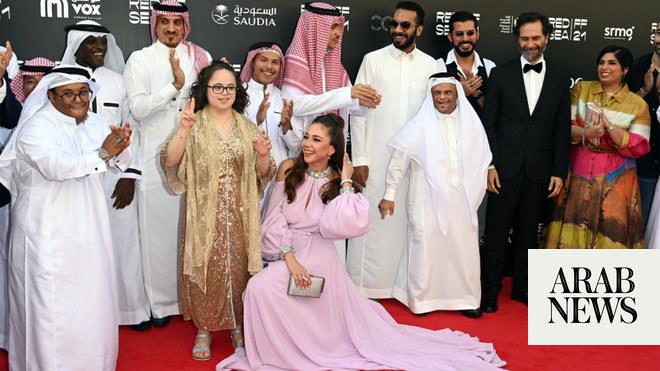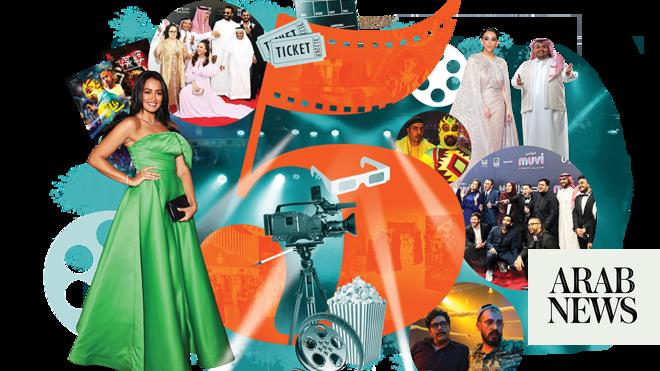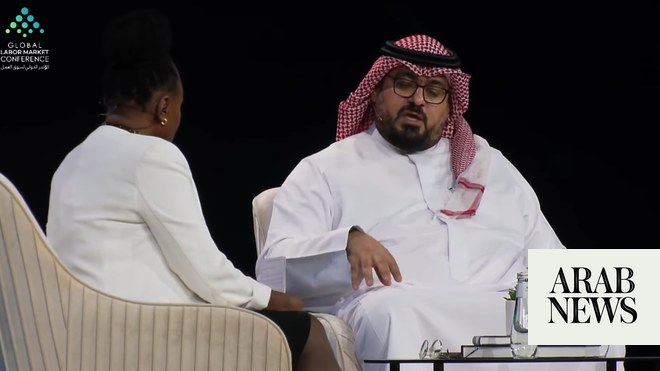
RIYADH: This month, Saudi Arabia marks six years of movie screenings after a 35-year gap. Back then, the idea of a flourishing domestic film industry seemed improbable. Today, it has become a reality.
Since cinemas reopened on April 18, 2018, multiplexes have prospered, with accumulative box office revenues hitting almost $1 billion. Even the closures of the pandemic years were not enough to halt the industry’s meteoric rise.
Cities across the Kingdom now boast their own world-class movie theaters, screening the latest international blockbusters, regional hits and domestic productions, while homegrown film-making capability is now routinely spotlighted at local film festivals.
Saudis gather at a cinema theatre in Riyadh on April 30, 2018. (AFP)
With the launch of the Red Sea Film Festival in December 2021 and the establishment in 2020 of the Saudi Film Commission under the Ministry of Culture, many Saudis who were working in production houses overseas are now relocating to the Kingdom.
“The year 2018 marked a significant turning point for Saudi filmmakers and audiences as well,” Saudi film producer Mohammed Al-Turki, who was named CEO of the Red Sea Film Festival in 2022, told Arab News.
“The Saudi box office is growing rapidly. These achievements reflect the filmmakers’ passion for crafting captivating stories that are deeply embedded in our culture and resonate with an engaged local audience.”
The launch of the Red Sea Film Festival in 2021 prompted many Saudis who were working in production houses overseas to relocate to the Kingdom. (Red Sea Film Festival)
Saudi filmmakers are making their mark both locally and internationally. Among them are Tawfiq Al-Zaidi, the Qudus brothers, Ali Al-Kalthami, and Mishal Al-Jasser, said Al-Turki. “All tirelessly striving to deliver their finest work.”
The Red Sea Film Foundation, which was created in 2019 after the cinema ban was lifted, has become a catalyst for the industry’s expansion, staging one of the Middle East’s biggest film festivals in partnership with other major gatherings in the world cinema calendar.
RSFF has developed a variety of programs and initiatives specifically tailored to filmmakers from the Arab world, Africa, and Asia, with a special focus on Saudi filmmakers.
“Our programs include the Red Sea Fund, which offers financial support to film projects at various stages from development through to post-production,” said Al-Turki. “The Red Sea Labs provide a range of training workshops and courses for filmmakers.”
Winners and jury members posing on stage at the end of the second RSFF’s awards ceremony on December 8, 2022. (AFP)
Additionally, the Red Sea Souk acts as a networking hub, providing numerous developmental programs.
“Among our recent successful initiatives is our collaboration with the Series Mania festival, which has enabled several promising Saudi filmmakers to advance their television projects and gain exposure at one of the world’s foremost television festivals,” said Al-Turki.
“We continue to launch many value-adding programs aimed at nurturing rising Saudi talent.”
The Kingdom has established several initiatives to support the industry. Most recently, a SR375 million ($100 million) Saudi Film Fund was unveiled by the government’s Cultural Development Fund in partnership with local investment firm MEFIC Capital and Roaa Media Ventures, a holding company that promotes local media projects and talent.
The fund will collaborate with major international studios to invest in film production that provides content reflecting Saudi culture and values.
Such government initiatives are also spurring the private sector. In 2023, Syed Ali launched 40Films KSA to work with local and international clients.
Ibraheem Alkhairallah on the set of Saudi film “Sattar,” where he portrayed the character of Abdulkhaleq, an undercover officer pretending to be a wrestling coach. (Supplied)
“This cinematic renaissance has made a positive impact on our business, fueling commitment to nurture more and meet the top standards being set daily in the market,” Ali, a Pakistani businessman based in Riyadh, told Arab News.
“The Kingdom is not just a consumer of global cinema; it is a creator, contributing its unique voice to the rich tapestry of world cinema. Saudi filmmakers are narrating stories that captivate audiences both at home and around the globe.”
Saudi filmmaker Mujtaba Saeed, who is based between the Kingdom and Germany, says he has also benefited from the boom in the Saudi entertainment industry and will begin working on a film to be shot in the Eastern Province at the end of this year.
The film, titled “Drowning,” will be funded by the Red Sea Film Festival, the King Abdulaziz Center for World Culture, and the Saudi Film Commission. “Without this support I would not have been able to shoot the film,” Saeed told Arab News.
“The great developments in the Saudi film industry have greatly contributed to the growth of my work as a young director. Through increased opportunities for collaboration and greater support I have access to resources and support that were previously unavailable to me.”
Two young Saudi film directors have been presented with trophies after winning the second edition of a 48-hour filmmaking challenge. (AN Photo/Ali Khameq)
During the Cannes Film Festival in 2022, the Saudi Film Commission announced an incentive program aimed at transforming the Kingdom into a global hub for film production. This included 40 percent returns for productions that hired local crews, among other initiatives.
The incentive program was announced a few months after the RSFF established the Red Sea Fund to support Arab and African filmmakers and directors. The $10 million fund has backed more than 250 projects since its launch.
It is through schemes such as these that the RSFF aims to foster “cultural connections,” providing a platform for up-and-coming film talent in the Kingdom, said Al-Turki.
The Saudi Film Commission is responsible for numerous initiatives that have helped bolster the Saudi industry at home and abroad by providing young Saudi filmmakers with opportunities.
One example is “Norah,” a Saudi production that will be screened at the 77th Cannes Film Festival this year in its “Un Certain Regard” section. It will be the first time a Saudi movie has been selected for the prestigious festival.
Directed by Saudi Tawfik Alzaidi and produced by American Paul Miller, formerly the head of finance at the Doha Film Institute, the film is the first Saudi movie shot entirely in the AlUla region.
Poster of Saudi movie “Norah.” (Supplied)
Supported by the Red Sea Fund, the film also clinched the top prize of a funding award from the Saudi Film Commission’s Daou Competition — an initiative launched by the Kingdom’s Ministry of Culture in September 2019 to bolster Saudi film production and nurture the country’s next generation of filmmakers.
Set in Saudi Arabia during the 1990s, the film follows Norah, a young Saudi woman who lives in a small village, who is introduced to Nader, an artist. Norah asks him to paint her portrait and soon an artistic relationship develops between them.
The film, Alzaidi’s debut feature, explores the period of Saudi conservatism and the various forms of art that were banned. It examines how art can facilitate communication between people and foster social change.
In the run-up to the sixth anniversary of the lifting of the cinema ban, the Saudi Film Commission organized the fourth edition of the Gulf Cinema Festival, which ran from April 14 to 18.
This was the first time the festival was managed by a government agency, underlining the recognition of the socio-cultural and economic importance of the film industry for the Kingdom.
The Gulf Cinema Festival brought together several pioneers of Gulf cinema to share their visions and experiences in film production. (Supplied)
In a speech during the opening of the festival, the Film Commission’s CEO Abdullah bin Nasser Al-Qahtani said “this edition of the festival represents a crucial milestone in cultural cooperation among the Gulf Cooperation Council countries and embodies our wise leadership’s commitment to enhancing collaboration among us,” according to SPA.
“This festival, which brings us together today, reflects the strong connection between ambition and the cultural strategy of the GCC countries, which play a significant role in enhancing cultural exchange, expanding infrastructure, drawing inspiration from successful experiences, and encouraging Gulf talents to offer more,” he said.
The booming Saudi entertainment industry is also attracting directors from across the world to shoot and produce films in the Kingdom.
Over the last 18 months, the landscapes of NEOM in the Tabuk region have been featured in several international films, including Ruper Wyatt’s “Desert Warrior,” starring Anthony Mackie and Sir Ben Kingsley; “Dunki” directed by Indian filmmaker Rajkumar Hirani starring Shahrukh Khan; the first regional reality TV show “Million Dollar Island;” and the “Rise of the Witches,” the region’s largest-ever budget TV show.
As deals continue to be made and incentives offered for making movies in Saudi Arabia, the future looks bright not only for domestic movie theaters but also for local, regional and international filmmakers and producers intending to work and collaborate in the Kingdom.
“Despite these accomplishments, this is merely the start,” said Al-Turki. “Saudi cinema has much more to accomplish.”











